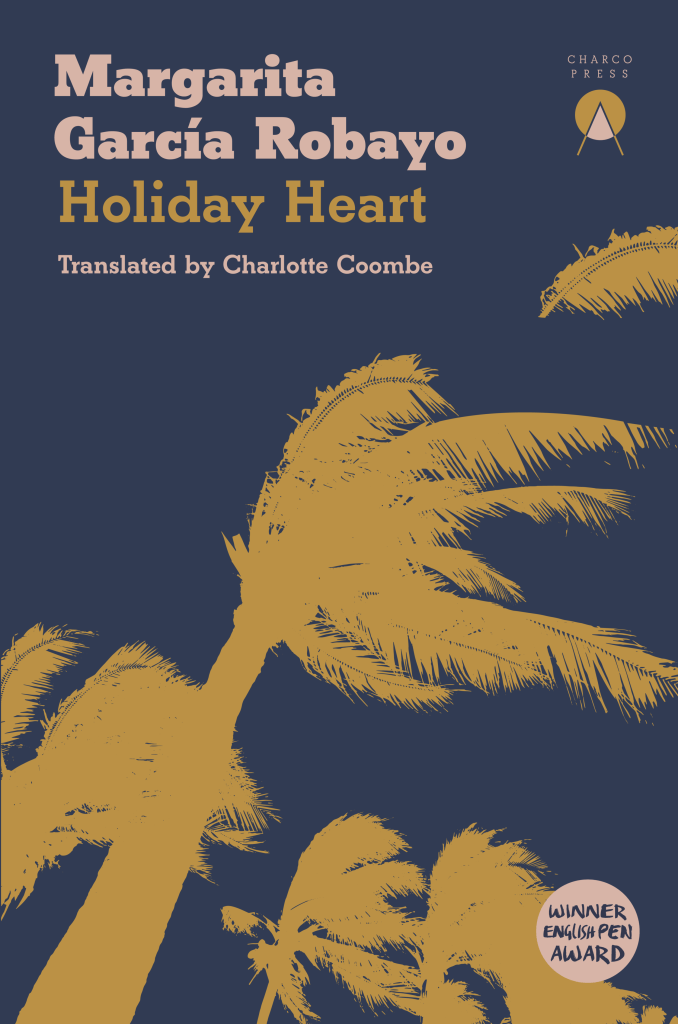Defined as ‘abnormal heart rhythms’, Holiday Heart Syndrome is the beat to which Margarita García Robayo conducts this bleak vivisection of marriage and Latinx experience. It is fragility alongside strength; selfishness alongside compassion. Holiday Heart is both illness, suffered by those who drink to excess, and longing, suffered by those whose hearts reside on the horizon.
But, as Pablo and Lucía, a married Colombian couple living in America, know all too well, the horizon never gets any closer. They are angry. They are impatient. They are yearning and awful and passionate. Husband and wife, writer and teacher, father and mother, these are two people any reader would be hard-pressed to figure out why they got together.
Lucía is obsessed with separating herself from people with darker skin, and looks down on other Latinx people she encounters. Her bigoted views are highlighted when she explicates a correlation between skin colour and vulgarity. García Robayo deliberately turns Lucía’s interactions into ‘we’ situations – ones which allow her to identify as American, until she flips the ‘we’ to ‘they’, when observing African-Americans, receptionists, nannies or high school teachers. Here, García Robayo amplifies the caustic hierarchical racism that pits minority ethnic people against assimilation. Lucía’s distaste for the Russians she sees on the beach at the book’s beginning serves as a reliable, if expected, foundation to her Americanisation – that old, stereotypical ‘us-v-them’. The Russians, meanwhile, are celebrating the 4th of July, and yet Lucía still finds their patriotic demonstrations abhorrently clichéd. Her opinion smacks of contemporary American exceptionalism, while the Russians’ participation suggests a more progressive move away from rigid notions of national identity.
In this sense, Lucía’s relationship with her adopted country is transactional: she gets from it the ability to make her own success story, one which might otherwise elude her at home in Colombia. In return, she pays in to a system which, ironically, is set against that success becoming real, whilst simultaneously extending her right to criticise the very thing she has come looking for, and the person she made the journey with.
Her relationship with her family is similar: the birth of their children gave Lucía and Pablo something to stay together for, and she’ll give them the love and protection they need until the day they find someone else to do it better. She says that ‘aliens have taken up residence in [her] body.’ In motherhood, marriage, and migration, she has become a guest – of her body, her life, her country. To both parents, ‘silence [is] armour,’ and they vie for control over who can demonstrate the least amount of care for the other, while rewarding their children’s poor behaviour with nothing more than a stern word.
Pablo refers to his home town as ‘his city’ – a strange concept based on ownership and rooted in identity. Pablo coasts through life at home, his wife and children away, while his mind inhabits a place he almost never goes to anymore: Colombia. This is place as idol, the return as ritual. Everything Pablo centres himself around is longed-for: the book he is never going to finish, the teenage student he has become too familiar with, the days when his wife didn’t hate him and he could interact with his children without using fart jokes. Pablo dreams, and in doing so perform a sigh of relief, of familiarity, on the rare occasions he actually returns to the roots he professes are so important, whilst simultaneously alienating those closest to him and committing acts of infidelity and abuse.
Lucía and Pablo are so disconnected from their past and future, their roots and relatives; they are so disenchanted with their lives as suburban husband, wife and parents, that they barely acknowledge the last ounce of identification they have – the one that comes from knowing that they are slightly higher on the ladder of trickle-down racism.
Lucía condemns ‘Latin Americans and their identity complex.’ The book’s obsession with ‘shades of blackness’, emphasises Latinx immigrants trying to integrate as whites, as though suffering dysmorphia and forcing themselves alien bodies which carry them around, inches from the ground, between identical suburban homes, stripped of all heritage. Lucía and Pablo are so disconnected from their past and future, their roots and relatives; they are so disenchanted with their lives as suburban husband, wife and parents, that they barely acknowledge the last ounce of identification they have – the one that comes from knowing that they are slightly higher on the ladder of trickle-down racism.
‘Anything to do with the idea of homeland, or patriotism, is corny,’ thinks Lucía. And no one is ‘born with a flag tattooed on their neck.’ Whenever her children ask her where she is from, Lucía tells them, ‘from here, from our house.’ A building that is ‘practically identical to all the other houses on the street.’ Her belief that a ‘homeland is something that moves with you’ proves that she is leaving Pablo in the dust. In the surf. To be washed away by a tide of tired, redundant ideals, while she pushes on with their children in a way that is, ironically, neither progressive nor open-minded. If Pablo is the typical, sad, self-pitying male, then Lucía is at the very least hypocritical.
The intentionally problematic representation of people with darker skin as aggressive, threatening and generally loathsome, is uncomfortable reading, and makes it difficult to reconcile with Lucía and Pablo’s personal problems. Lucía, perhaps, is using skin colour to explore a broader, and less problematic, critique of men in general. She states that ‘all men… are united by their infinite capacity to create violence.’ She writes about it in her magazine column. She does not hide her disdain for her husband. And by doing so she’s allowing her son, Tomás, to grow up with the same prejudices – towards the Russians at the beach, towards Venezuelans, towards people with darker skin than theirs – that might one day manifest in the very violence the accuses other people of.
This is an issue of nurture over nature, but Lucía seems to not care that when her son shouts racist remarks in public, and appears to be encouraging him to develop his own opinions. The problem is, he is not yet a teenager. And if Pablo’s dalliances with a high school student he teaches prove anything, it’s that children of all ages should not be held responsible for the actions, or inaction, of the adults who hold positions of power that directly affect them.
Pablo’s connection with his son and daughter has been relegated from care giver, to joke cracker. The amount of time he has with them in person is negligible. He is an absent father, existent in Skype calls, backlit to highlight how little he knows the trajectory that his children, and marriage, are taking. He tries to write female characters who are what he thinks his wife could be. He critiques Lucía’s decision to go to her parent’s beach-side apartment with the children without him, suggesting that ‘an intelligent woman… would never leave her husband after so many years. She would prefer a miserable but stable life to the unpredictability of happiness.’
Lucía does not want to live in ‘limbo land’, and yet that is exactly the place where her family resides. Knowing this, Pablo makes no concerted effort to elevate their marriage beyond its base functionality. There are glimmers of hope between the couple – a kind word, a flickering smile – but the raw contempt is tangible, and nasty to behold. Their battle is constant, consuming, and in the end, there are no winners.
At times, Robayo’s use of language and her narrator’s tendency to describe physicality with sharp, surgical precision, is difficult to stomach. There is an urgency to the narrative, that leaves the reader wondering what it’s all for, and creates an impatience to escape the cloying, decaying world the author has built in Holiday Heart that almost matches that of its inhabitants.
Margarita García Robayo was born in 1980 in Cartagena, Colombia, and now lives in Buenos Aires where she has worked as a journalist and scriptwriter. She is the author of three novels, a book of autobiographical essays and several collections of short stories, including Worse Things, which obtained the prestigious Casa de las Américas Prize in 2014. Her books have been published widely and praised in Latin America and Spain and have been translated into several languages, including Chinese, Hebrew and Turkish. Holiday Heart is her second book to appear in English after the very successful Fish Soup, selected by the TLS as one of the best fiction titles of 2018.
Charlotte Coombe is a British literary translator, working from French and Spanish. Her translation of Abnousse Shalmani’s Khomeini, Sade and Me (2016) won a PEN Translates award in 2015. She has translated authors such as Marvel Moreno, Anna Soler-Pont and Asha Miró, Edgardo Nuñez Caballero, Rosa María Roffiel and Santiago Roncagliolo. She is also the translator of Eduardo Berti’s novel The Imagined Land (2018). For Charco Press, she has translated three titles, namely: Ricardo Romero’s The President’s Room (2017), and Margarita García Robayo’s Fish Soup (2018) (Shortlisted for the Valle Inclán Translation Prize in 2019) and Holiday Heart (2020).
Harry Gallon is a London-based author, editor and ghostwriter, represented by Marjacq Scripts. He is the longlisting reader for The Bridport Prize first novel award, contributing editor for Minor Lit[s] and his work features in numerous publications, including Forward Poetry, Open Pen and The London Magazine. His debut novel, The Shapes of Dogs’ Eyes, was published in 2015, its follow-up, Every Fox is a Rabid Fox, in 2017. His third novel, Small Rivers, is due for release in 2021. @hcagallon


